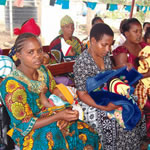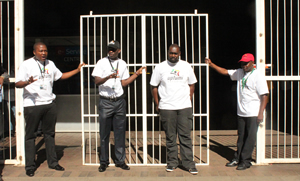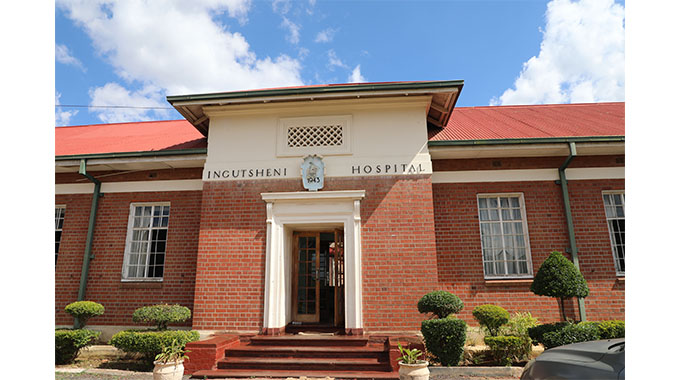HIV policy: A let down for under-16s

primary school pupil because of his small frame, a result of stunted growth.
After his mother died from an Aids-related illness, Timmy is anxious to know his own HIV status.
But he is hindered by a policy which forbids testing for minors without the consent of their parents and/or guardians.
“I want to know my status because of what happened to my mother,” Timmy says.
He adds: “This is my life, my blood, and why should other people who are afraid of getting tested determine what should happen to me?
“I have a feeling that my mother could have transmitted the disease to my sister and I during birth since she avoided Prevention of Mother to Child Transmission programmes.
“I want to get tested so that health officials can tell me when to start taking ARVs. I want to finish my studies, go to university and get a job. And, I do not want my life cut short because of other people who have to make the decision for me.”
Timmy was born in a shack in Mbare’s Joburg Lines with the help of a traditional midwife after his mother decided not to go back to an antenatal clinic to collect results for a mandatory HIV test for pregnant women.
The only time she returned to the clinic was when she went to obtain the baby’s birth register two days later, but she did not ask for her HIV test results.
The woman went the traditional way again when she gave birth to Timmy’s sister in January 2003 and missed out on Prevention of Mother to Child Transmission.
In 2006, she was admitted in hospital seriously ill from tuberculosis and got to know about her HIV-positive status after several tests to establish the extent of her illness.
She succumbed to the disease the following year.
Timmy is a member of his school’s HIV and Aids club, hence his knowledge of HIV and Aids.
He is keen to learn more about the various ways through which the virus is transmitted and how to curb its spread as he has been doing since Grade 3.
“After learning about HIV and Aids at the school club, I went to a New Start Centre to get tested but they told me they could not do so without the consent of my father or a guardian,” Timmy said.
Timmy’s fate, like that of thousands other children in similar circumstances, lies in the hands of guardians and in some cases parents who should first overcome denial, stigma and discrimination to appreciate the importance of HIV testing and counselling among themselves and ultimately, their children.
Children have remained vulnerable despite the availability of HIV paediatric services nationwide, raising the question why there has not been a review of the policy.
in contrast to the well-described infant Aids epidemic, adolescent Aids has only recently become clinically appa-rent because of the delay between being infected in infancy and becoming symptomatic in adolescence.
Mrs Clara Mafa of Highfield said she went to Harare Central Hospital with her brother’s seven-year-old daughter who had visited for the school holidays after she saw discharge from the little girl’s private parts.
Her brother is HIV-positive and the whole family is aware of his status.
“I thought that she was raped, and took her to the hospital for an examination. The results said she had not been raped and I wondered where the discharge was coming from.
“Knowing my brother’s status and seeing the pain my niece was in, I took it upon myself to get her tested for HIV, but the hospital refused saying only her father could authorise the test. They said I could only get her tested if I produced evidence that I am a legal guardian.
“I then called my brother who is sstill in denial of his status and asked him to come to Harare and get his daughter tested, but he refused.
“The child has not been tested ever since. I do not know what to do next. It seems I am the one worried about her health yet her parent is not even concerned,” she said.
Mrs Mary Mutize, a Chitungwiza resident and mother of four minor children, strongly opposes the testing of children under-16 without the parents’ consent.
She says minors cannot understand the implications of the test results, hence the need for the parent to make the choice.
But Mrs Anna Gora, a nurse who lives in Mufakose disagrees.
“They are our children but they also have their right to access treatment,” Mrs Gora said.
She added: “The policy has been infringing our children’s rights and it is time they make their own decisions. I have come across children who have all clinical signs of HIV but the parents refuse to get them tested even if you talk to them about provider initiated testing and counselling. Some of the children eventually die and it is quite a painful experience.”
John (not real name) (14) an orphan said his parents died of HIV-related illnesses three years back and he has been taking care of his two siblings aged 11 and six ever since.
He has dropped out of school and sells sweets and cigarettes at Mbare Musika bus terminal making up to US$10 per day.
The abnormal had become normal for the teenage boy until when his younger brother got ill.
“All our relatives refused to take him to the clinic for treatment, so I took it upon myself to save his life.
“He was treated for pneumonia, but was always sick from other diseases. A neighbour at our hostel told me to go with him to the New Start Centre for an HIV test and I complied.
“At the New Start Centre, I was told that we were both minors hence I could not authorise my brother’s blood test. I went back home and did not know what to do. I wish our parents took us for HIV testing before they died,” he said.
The National Policy on HIV/Aids for Zimbabwe 1999 does not force anyone to undergo HIV testing and neither does it force one to collect results once tested, hence the parents of these children cannot be pushed to get them tested.
The policy says: “HIV testing is subject to client consent. If informed consent to HIV testing is not obtained, the client’s motivation to receive and accept the results may be compromised and can induce denial of one’s HIV status . . . “
This has put minors in a dilemma as parents or guardians may choose to or not to have them tested and put on ART.
It is also sad that some parents opt out of PMTCT programmes, which have remained one of the major HIV transmission prevention methods in the country.
The PMTCT programme was launched in 1999, the same year Timmy was born, under the framework of the national HIV and Aids policy.
Timmy could have known his status early, had his mother taken the HIV test seriously and gone back to collect her results.
PMTCT services are currently offered in 910 health facilities with a further 650 sites providing routine antenatal and postnatal care but unable to provide on-site HIV testing. But this is no excuse for exposing unborn children to HIV and not taking them for further tests when they are born.
The PMTCT programmes are open to all women but due to fear and other unknown reasons, some do not access the services resulting in children missing out on ART.
According to the maternal and neonatal roadmap, 32 percent of women opt to deliver from home. This trend shows a consistent decline in institutional deliveries over the years, compromising safety for both mother and baby during delivery.
Throughout 2008, 224 637 pregnant women booked for a first ANC visit. Of these, 226 713 pregnant women were counselled for HIV and 78 percent were tested.
Based on the national HIV estimates from 2008 to 2009, it was estimated that at population level, 50 702 pregnant women were expected to be HIV positive. The national PMTCT programme was therefore able to achieve an estimated 49 percent coverage in 2008, a figure far below the expected universal coverage of services given that about 95 percent of HIV in children is through vertical transmission.
The Zimbabwe HIV and Aids estimates 2009 pegged the HIV population of children at 109 175 in 2007. The figure went down to 107 388 in 2008 and then to 105 740 in 2009.
The World Health Organisation (WHO) “Survey of children accessing HIV services in a high prevalence setting: time for adolescents to count” released in March 2009 also confirms the fears of many children.
It says HIV testing of older children has not been emphasised because, until recently, long-term survival in the absence of treatment following PMTCT was thought to be uncommon.
“This means that HIV testing for young people in Zimbabwe can only be accessed in health-care facilities, with no freestanding HIV-testing services for children less than 16 years of age.
“Legal barriers to testing young people further hinder this process, because testing people less than 16 years of age requires consent from a legal guardian. High rates of orphanhood result in frequent movement of children between different extended family members, with no clearly defined guardianship.
“We found that most children were diagnosed following presentation with acute illness; only a minority accessed testing through primary care or freestanding HIV-testing services,” says the report.
Health expert from the Centre for Health Strategy (CHEST) who is the also the chairperson of the parliamentary portfolio committee and former Minister of Health and Child Welfare, Dr David Parirenyatwa said there is need for a movement to educate people that it is desirable to have children tested and put on treatment.
Dr Parirenyatwa said current policy protects children under the Child Protection Act hence the need to have them tested with the consent of a parent or guardian. This, he said, is to allow counselling and testing of a child in the presence of the parent or guardian. He said these are issues that should be looked at because children at secondary school and polytechnics, despite knowing that they can be tested and showing some kind of maturity cannot do it without the consent of a parent or guardian.
The former health minister said the provision of provider initiated testing and counselling when doctors and nurses counsel and test patients is an entry point that if followed is likely to provide a solution to the problem of HIV testing in children.
He said homes and institutions can act as guardians for orphans and vulnerable children under their care.
“If not in an institution, the health care provider has the duty to counsel the child,” added Dr Parirenyatwa.
“However, what is happening is that a lot of children got infected in uteri, meaning that they were born HIV positive.
“We now have a whole generation of HIV positive adolescents and the issue is being discussed actively at the Centre for Health Strategies. We are looking at what can be done to urgently find a solution to the issue of HIV testing of children under 16 without the consent of a parent of guardian,” said Dr Parirenyatwa.
Other countries like South Africa have managed to flex their muscles on the policy of HIV testing of minors.
According to South African Medical Journal (SAMJ), South African children under 18 are legal minors who, in that country’s law, are not fully capable of acting independently without assistance from parents or legal guardians.
However, in recognition of the evolving capacity of children, there are exceptional circumstances where the law has granted minors the capacity to act independently.
Currently, children can consent independently to an HIV test from the age of 12, when it is in their best interest and below the age of 12 if they demonstrate “sufficient maturity”; ie they must be able to understand the benefits, risks and social implications of an HIV test.
This norm is not likely to change in the immediate future.
For as long as Zimbabwean children under 16 require the consent of a parent or guardian to get tested for HIV and useful information is not given to them, only fate will keep minors like Timmy and John’s brother alive to the age of 18 when they can be liable to have an independent test.
[email protected]








Comments